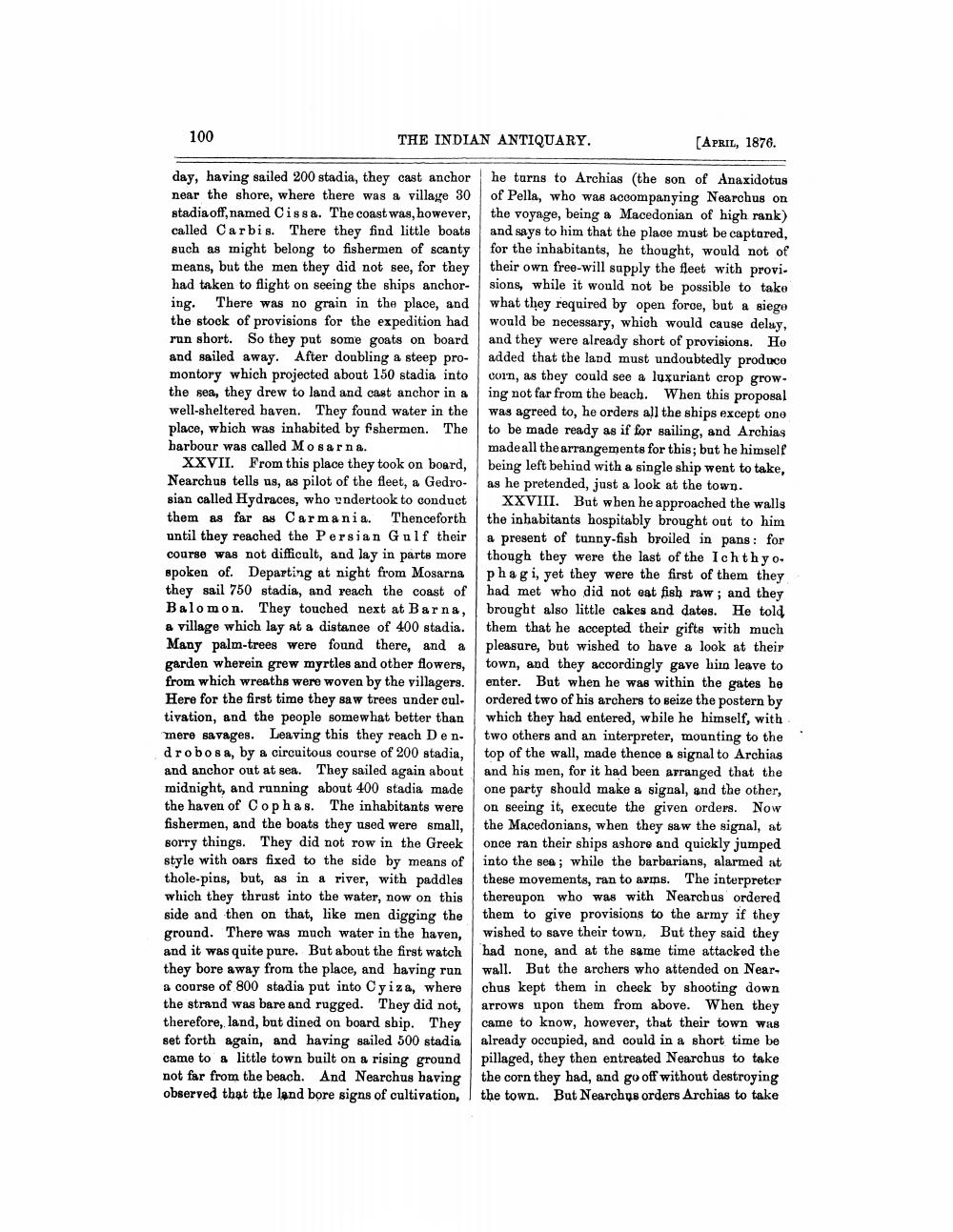________________
100
THE INDIAN ANTIQUARY.
day, having sailed 200 stadia, they cast anchor near the shore, where there was a village 30 stadia off, named Cissa. The coast was, however, called Carbis. There they find little boats such as might belong to fishermen of scanty means, but the men they did not see, for they had taken to flight on seeing the ships anchoring. There was no grain in the place, and the stock of provisions for the expedition had run short. So they put some goats on board and sailed away. After doubling a steep promontory which projected about 150 stadia into the sea, they drew to land and cast anchor in a well-sheltered haven. They found water in the place, which was inhabited by fishermen. The barbour was called Mosarna.
XXVII. From this place they took on board, Nearchus tells us, as pilot of the fleet, a Gedrosian called Hydraces, who undertook to conduct them as far as Carmania. Thenceforth until they reached the Persian Gulf their course was not difficult, and lay in parts more spoken of Departing at night from Mosarna they sail 750 stadia, and reach the coast of Balomon. They touched next at Barna, a village which lay at a distance of 400 stadia. Many palm-trees were found there, and a garden wherein grew myrtles and other flowers, from which wreaths were woven by the villagers. Here for the first time they saw trees under cultivation, and the people somewhat better than mere savages. Leaving this they reach Dendrobosa, by a circuitous course of 200 stadia, and anchor out at sea. They sailed again about midnight, and running about 400 stadia made the haven of Cophas. The inhabitants were fishermen, and the boats they used were small, sorry things. They did not row in the Greek style with oars fixed to the side by means of thole-pins, but, as in a river, with paddles which they thrust into the water, now on this side and then on that, like men digging the ground. There was much water in the haven, and it was quite pure. But about the first watch they bore away from the place, and having run a course of 800 stadia put into Cyiza, where the strand was bare and rugged. They did not, therefore, land, but dined on board ship. They set forth again, and having sailed 500 stadia came to a little town built on a rising ground not far from the beach. And Nearchus having observed that the land bore signs of cultivation,
[APRIL, 1876.
he turns to Archias (the son of Anaxidotus of Pella, who was accompanying Nearchus on the voyage, being a Macedonian of high rank) and says to him that the place must be captured, for the inhabitants, he thought, would not of their own free-will supply the fleet with provisions, while it would not be possible to take what they required by open force, but a siego would be necessary, which would cause delay, and they were already short of provisions. Ho added that the land must undoubtedly produce corn, as they could see a luxuriant crop growing not far from the beach. When this proposal was agreed to, he orders all the ships except one to be made ready as if for sailing, and Archias made all the arrangements for this; but he himself being left behind with a single ship went to take, as he pretended, just a look at the town.
XXVIII. But when he approached the walls the inhabitants hospitably brought out to him a present of tunny-fish broiled in pans: for though they were the last of the Ichthyo. phagi, yet they were the first of them they had met who did not eat fish raw; and they brought also little cakes and dates. He told them that he accepted their gifts with much pleasure, but wished to have a look at their town, and they accordingly gave him leave to enter. But when he was within the gates he ordered two of his archers to seize the postern by which they had entered, while he himself, with two others and an interpreter, mounting to the top of the wall, made thence a signal to Archias and his men, for it had been arranged that the one party should make a signal, and the other, on seeing it, execute the given orders. Now the Macedonians, when they saw the signal, at once ran their ships ashore and quickly jumped into the sea; while the barbarians, alarmed at these movements, ran to arms. The interpreter thereupon who was with Nearchus ordered them to give provisions to the army if they wished to save their town, But they said they had none, and at the same time attacked the wall. But the archers who attended on Nearchus kept them in check by shooting down arrows upon them from above. When they came to know, however, that their town was already occupied, and could in a short time be pillaged, they then entreated Nearchus to take the corn they had, and go off without destroying the town. But Nearchus orders Archias to take




